Dave Clark interview - Stepping away from the oche but still battling against Parkinson’s
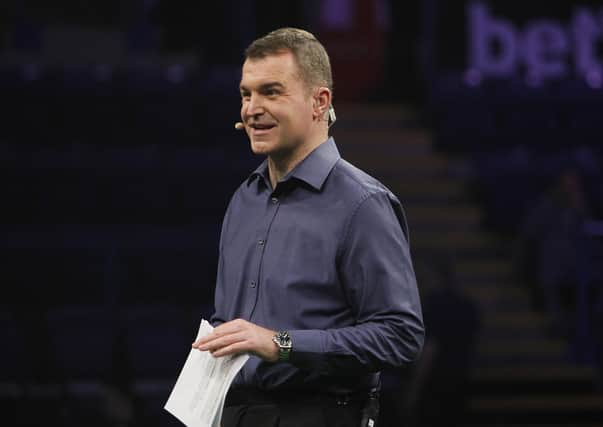

Television viewers have been denied the steadying, warming influence of Sky Sports anchor Dave Clark to pilot them through proceedings.
No gentle nudge of pundit Wayne Mardle to get a caustic response; no sensitive interviewing of a beaten semi-finalist.
Advertisement
Hide AdAdvertisement
Hide AdClark was the face of Sky’s darts coverage for two decades, a gentleman of his craft who knew when to talk and when not to talk.
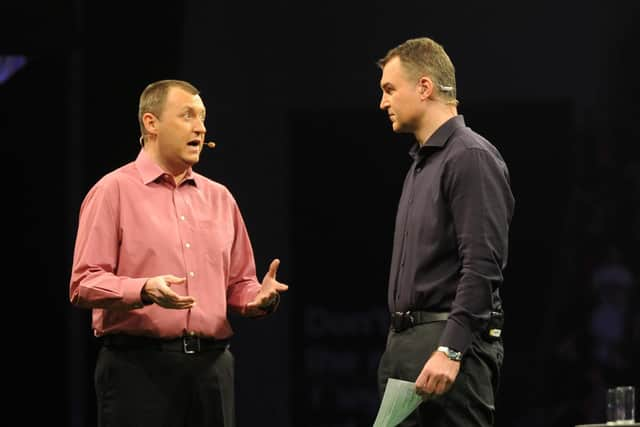

He also knew when to walk away, and this year was the perfect time.
As is common knowledge, Clark has been suffering with Parkinson’s disease for the best part of a decade.
He never sulked, he never asked for sympathy, but there was an implicit understanding between the viewer and the presenter that this was a man fighting with everything he had to not let the illness beat him.
Advertisement
Hide AdAdvertisement
Hide Ad“There were times when I couldn’t button-up my shirt before going on air, so I had to get a lady to button my shirt up,” says Clark, who stepped away at the height of the coronavirus pandemic.
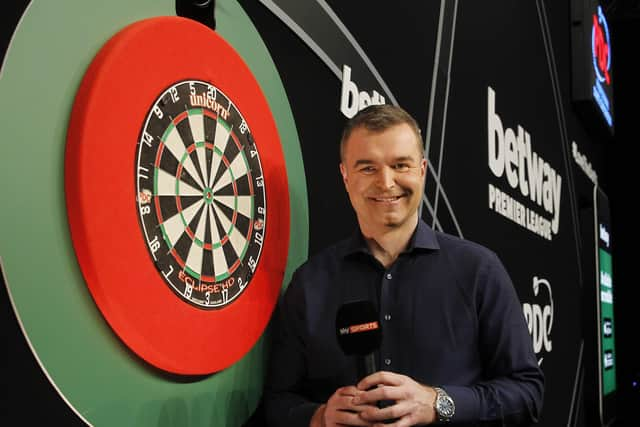

“I had to jam my hand down the side of the chair on occasions because it was shaking when I was on air.
“I even taught myself to write left-handed because my right hand wasn’t working particularly well on some days. They were just some of the problems I was facing last year.
“I could have done it this year but it would have been a struggle. Sixteen days is a long time on air, juggling your medication, trying to get it right in between the matches.
“Looking back, I don’t have any regrets now.
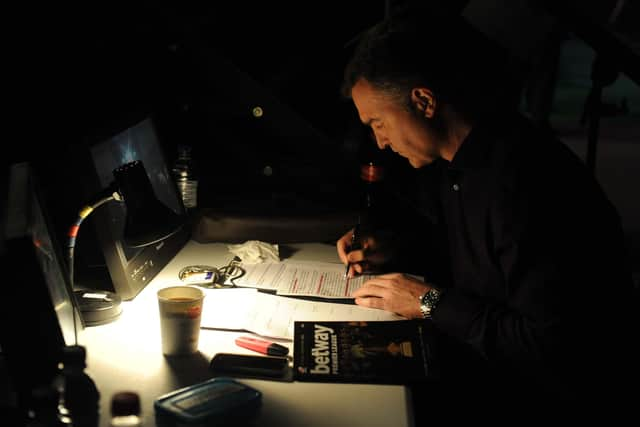

Advertisement
Hide AdAdvertisement
Hide Ad“It was becoming increasingly difficult and I wanted to go out at the top before I got that tap on the shoulder.
“Go out with dignity, go out at the top – perfect. There’s nothing but positivity around it and I’m very proud of that.”
Clark is as open and warm an interviewee as you would expect. No question about his illness is too much trouble.
“I was diagnosed in 2011, ten years this January,” he reflects. “The specialist said I’d do well to be presenting live sport for another two or three years. I managed nearly 10, so I’m very proud of that.”
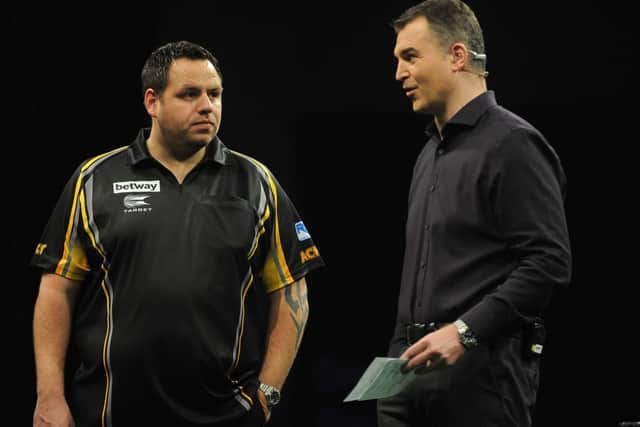

So how did it start?
Advertisement
Hide AdAdvertisement
Hide Ad“It’s weird things. I used to play five-a-side football and I thought I’d damaged my shoulder playing that because I was a bit stiff,” he says.
“Then my right hand was slow, it was claw-like occasionally. I look back at old videos of me and I can see I had it before I was diagnosed.
“When I was writing, the words would get smaller towards the end of a sentence. Those were the first signs.”
He could have kept his illness quiet, no-one would have been any the wiser, but as a visible member of the public, Clark appreciated that he had a platform to increase awareness, hence why he has raised more than £500,000 for Parkinson’s UK over the years.
Advertisement
Hide AdAdvertisement
Hide Ad“Every penny I raise goes towards research,” he says proudly. “Four years ago, I walked the coast to coast. I’ve done the Dalesway, Hadrian’s Wall. I’m more proud of that than anything I’ve achieved in broadcasting.”
In November, 2021 he plans to trek to Everest base camp with two fellow sufferers.
“I don’t know how Parkinson’s will react at 17,500-feet but we’re determined to give it a try,” he confirms.
Such determination is vital because the research is desperately needed. As Clark points out, the primary drug given those diagnosed first came on the market in 1967: “when Harold Wilson was prime minister, and man hadn’t landed on the moon. They’re still giving us the same drug as they did back then.
Advertisement
Hide AdAdvertisement
Hide Ad“We’re sciencing our way out of coronavirus but we can’t science our way out of Parkinson’s. There have been breakthroughs. They are repurposing a diabetes drug that is meant to stop shaking in Parkinson’s sufferers, so that could be a way forward without all the trials.
“There’s massive leaps being made. There’s definitely potential, it just needs money, a lot of money. Hopefully, people in my lifetime, or even the next generation, will be the last Parkinson’s sufferers.”
It may have brought a premature end to his broadcasting career, but it has not ended his life.
“You wake up every day not knowing how your Parkinson’s is going to affect you,” he continues.
“It’s a thief Parkinson’s; it takes away, it doesn’t give.
Advertisement
Hide AdAdvertisement
Hide Ad“But Parkinson’s has actually made me do stuff I wouldn’t otherwise have done, being a tight Yorkshireman.
“I’ve travelled the world, I’ve followed Bruce Springsteen around the world, seen him 18 times; Cape Town, Perth, the Nou Camp.
“I went to see his one man show on Broadway and when he walked up to me I said thanks for all you do for the Light of Day Foundation, which is a Parkinson’s charity.
“His road manager had Parkinson’s. He said ‘it’s a great organisation and I’m proud to work with them’.
Advertisement
Hide AdAdvertisement
Hide Ad“Just a few words with ‘The Boss’ was fantastic. A dream come true.”
Clark continues: “My boys (aged 18 and 15) have done a lot of travelling with me, we’ve swum with turtles on the great barrier reef, walked with the Maasai warriors on the Serengeti, visited Costa Rica.
“All those savings for rainy day trips, my rainy day has come.
“But I don’t want people to feel sorry for me, I’ve had an amazing life, so don’t feel sorry for me.”
Advertisement
Hide AdAdvertisement
Hide AdThe role he played in the rise of darts as a sporting spectacle is a source of enormous pride.
He was part of the launch of Sky Sports News in 1998 and attended his first PDC World Championship final that year on a guest ticket.
He has presented Sky’s coverage since 2001.
“I’ve always loved darts, I remember the Indoor League at the Leeds Irish Centre back in the day; we’d do arm wrestling and darts,” smiles Clark, who was raised in Ilkley, attended Ilkley Grammar School, played rugby for the local club and was junior captain at Ben Rhydding Golf Club.
“Jocky Wilson was my hero growing up. I never liked Eric Bristow because I thought he was a cocky southener but we became co-presenters and great friends in the end.
Advertisement
Hide AdAdvertisement
Hide Ad“Sport is all about personality and rivalry. You get that, you’ve got great TV.
“Taylor-Barney, MVG-Taylor; big characters, big personalities, big matches.
“Darts is a drama every three darts. At a football match, you might be waiting 90 minutes for drama.
“My first world championship we were at a strip club on the A13 in Essex and we ended up playing in the O2 Arena in front of 15,000 people. Incredible.
Advertisement
Hide AdAdvertisement
Hide Ad“A meteoric rise. Sky’s production, Barry Hearn’s promotional ability, the big characters – it just looked like a party you wanted to be at.
“And I presented the halcyon days of darts; Taylor v Barney, Taylor v Lewis, Gary Anderson playing his best darts. Big crowds as well.
“My eldest son turned 18 the other day and the only world championship I’ve missed is 2002, the year he was born.
“Harry’s 18th birthday just shows how long I was was doing it for.
Advertisement
Hide AdAdvertisement
Hide Ad“But there were days when I woke up and thought I can’t do it today, I’d just look into my soul and say ‘come on Clarkey, you’ve got to do it today’.
“The adrenalin rush, the medication and the crowd got me through.
“But you can only live on that for so long, there would eventually come a day when I failed and I didn’t want that.”
So he bowed out this year, an event in Liverpool in front of 7,000 people his final act before coronavirus shut down sport. The announcement came in the summer.
“It was completely my decision,” he reiterates.
Advertisement
Hide AdAdvertisement
Hide Ad“It’s very rare in this business that you get to bow out on top, on your own terms.
“I didn’t want to be in an empty arena, stood there for two hours and then I can’t talk to the players because they need to keep their distance from me.
“It was the perfect time.”
Support The Yorkshire Post and become a subscriber today. Your subscription will help us to continue to bring quality news to the people of Yorkshire. In return, you’ll see fewer ads on site, get free access to our app and receive exclusive members-only offers. Click HERE to subscribe.
Comment Guidelines
National World encourages reader discussion on our stories. User feedback, insights and back-and-forth exchanges add a rich layer of context to reporting. Please review our Community Guidelines before commenting.